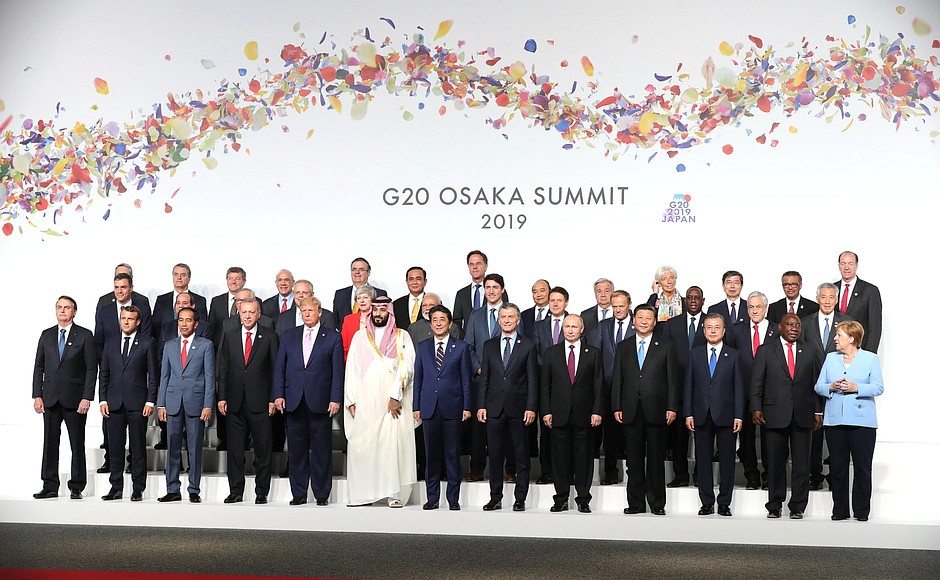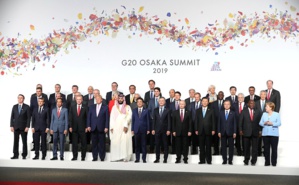The G20 Japan’s summit held in Osaka ended with a joint declaration on “crypto assets”, wherein they defined their commitments and reassured that global financial stability won’t be risked due to crypto assets. Moreover, the international forum also urged “standard-setting bodies” to carry out further work.
The said summit has been the largest gathering ever hosted by Japan which was spread over two days. During the event the leaders of G20 met with the “heads of invited guest countries and international organizations” and addressed issues like “global economy, trade and investment, innovation, digitization, and global finance”.
The joint declaration that was issued by the coalition on crypto assets read:
“We, the leaders of the G20, met in Osaka, Japan on 28-29 June 2019 to make united efforts to address major global economic challenges. We will work together to foster global economic growth, while harnessing the power of technological innovation, in particular digitalization, and its application for the benefit of all.”
Talking about global finance, the leaders of G20 stated:
“Technological innovations can deliver significant benefits to the financial system and the broader economy”.
“While crypto-assets do not pose a threat to global financial stability at this point, we are closely monitoring developments and remain vigilant to existing and emerging risks”.
On June 8, 2019 and June 9, 2019, the “G20 finance ministers and central bank governors” had met in Fukuaka, Japan and at the wrap of the event they issued a “joint statement”, while the declaration of G20 leaders comes as in addition to the previous statement. The joint statement of central bank governors and finance ministers features the risks posed by crypto assets on “consumer and investor protection, anti-money laundering (AML) and countering the financing of terrorism (CFT).”
The FSB or the Financial Stability Board presented “three reports” to the “G20 Finance Ministers and Central Bank Governors Meeting”, the first of which dealt with “crypto asset regulators”, the second provided the details of “standard-setting organizations’ regulatory approaches and work underway on crypto assets”, while the third one covered “financial stability, regulatory and governance implications of decentralized financial technologies”.
Furthermore, the declaration by G20 leaders stated:
“We welcome on-going work by the Financial Stability Board (FSB) and other standard-setting bodies and ask them to advise on additional multilateral responses as needed”.
“We also welcome the FSB’s work on the possible implications of decentralized financial technologies and how regulators can engage other stakeholders. We also continue to step up efforts to enhance cyber resilience.”
Outlining the progress made by the FSB, its Chairman Randal K. Quarles wrote a letter to the G20 leaders which was presented at the summit. Quarles wrote:
“Harnessing the benefits of financial innovation while containing risks – a deep and early understanding of how technological innovation may transform financial institutions and markets is key for harnessing benefits while containing risks”.
“A wider use of new types of crypto-assets for retail payment purposes would warrant close scrutiny by authorities to ensure that they are subject to high standards of regulation.”
On a concluding note the Chairman added:
“The FSB and standard-setting bodies will monitor risks very closely and in a coordinated fashion, and consider additional multilateral responses as needed”.
While the FSB informed that some members pointed out “the policy implications of crypto-assets do not always fit neatly into existing remits, which could result in significant regulatory asymmetries, potentially including with respect to investor and consumer protection issues.”
Although, some members are of the opinion “that the majority of issues can be addressed with existing policy tools.” And the Board concluded with a recommendation it added “that the G20 keep the topic of regulatory approaches and potential gaps, including the question of whether more coordination is needed, under review.”
Further, the “G20 finance ministers and central bank governors” said that they “welcome progress on the FSB’s initiative to identify effective practices for response to and recovery from cyber incidents.”
As per FSB’s lat year’s report submitted to G20 in March 2018, the crypto assets were not a threat to “global financial stability”, although it had mentioned that the situation could alter in case, they “were to become significantly more widely used or interconnected with the core of the financial system.”
However, the Board came out with an updated assessment of the impact of Crypto assets on “global financial stability”, whereby stating:
“To date, the FSB continues to assess that crypto-assets do not pose material risks to global financial stability at present, but that they do raise a number of further policy issues beyond financial stability.”
It also added that it “assesses that vigilant monitoring remains warranted particularly as a variety of new products and services seem to be under development”.
On the other hand, FATF has been actively dealing with crypto assets, whereby it has come out with “new guidance on the risk-based approach for virtual assets and virtual asset service providers”. Nevertheless, some people from the industry are not happy with the idea of implementing “some of the recommendations”.
In fact, the declaration of G20 leaders also recognised FATF’s work on crypto assets and mentioned:
“We reaffirm our commitment to applying the recently amended FATF Standards to virtual assets and related providers for anti-money laundering and countering the financing of terrorism.”
“We welcome the adoption of the Financial Action Task Force (FATF) Interpretive Note and Guidance.”
References:
news.bitcoin.com
The said summit has been the largest gathering ever hosted by Japan which was spread over two days. During the event the leaders of G20 met with the “heads of invited guest countries and international organizations” and addressed issues like “global economy, trade and investment, innovation, digitization, and global finance”.
The joint declaration that was issued by the coalition on crypto assets read:
“We, the leaders of the G20, met in Osaka, Japan on 28-29 June 2019 to make united efforts to address major global economic challenges. We will work together to foster global economic growth, while harnessing the power of technological innovation, in particular digitalization, and its application for the benefit of all.”
Talking about global finance, the leaders of G20 stated:
“Technological innovations can deliver significant benefits to the financial system and the broader economy”.
“While crypto-assets do not pose a threat to global financial stability at this point, we are closely monitoring developments and remain vigilant to existing and emerging risks”.
On June 8, 2019 and June 9, 2019, the “G20 finance ministers and central bank governors” had met in Fukuaka, Japan and at the wrap of the event they issued a “joint statement”, while the declaration of G20 leaders comes as in addition to the previous statement. The joint statement of central bank governors and finance ministers features the risks posed by crypto assets on “consumer and investor protection, anti-money laundering (AML) and countering the financing of terrorism (CFT).”
The FSB or the Financial Stability Board presented “three reports” to the “G20 Finance Ministers and Central Bank Governors Meeting”, the first of which dealt with “crypto asset regulators”, the second provided the details of “standard-setting organizations’ regulatory approaches and work underway on crypto assets”, while the third one covered “financial stability, regulatory and governance implications of decentralized financial technologies”.
Furthermore, the declaration by G20 leaders stated:
“We welcome on-going work by the Financial Stability Board (FSB) and other standard-setting bodies and ask them to advise on additional multilateral responses as needed”.
“We also welcome the FSB’s work on the possible implications of decentralized financial technologies and how regulators can engage other stakeholders. We also continue to step up efforts to enhance cyber resilience.”
Outlining the progress made by the FSB, its Chairman Randal K. Quarles wrote a letter to the G20 leaders which was presented at the summit. Quarles wrote:
“Harnessing the benefits of financial innovation while containing risks – a deep and early understanding of how technological innovation may transform financial institutions and markets is key for harnessing benefits while containing risks”.
“A wider use of new types of crypto-assets for retail payment purposes would warrant close scrutiny by authorities to ensure that they are subject to high standards of regulation.”
On a concluding note the Chairman added:
“The FSB and standard-setting bodies will monitor risks very closely and in a coordinated fashion, and consider additional multilateral responses as needed”.
While the FSB informed that some members pointed out “the policy implications of crypto-assets do not always fit neatly into existing remits, which could result in significant regulatory asymmetries, potentially including with respect to investor and consumer protection issues.”
Although, some members are of the opinion “that the majority of issues can be addressed with existing policy tools.” And the Board concluded with a recommendation it added “that the G20 keep the topic of regulatory approaches and potential gaps, including the question of whether more coordination is needed, under review.”
Further, the “G20 finance ministers and central bank governors” said that they “welcome progress on the FSB’s initiative to identify effective practices for response to and recovery from cyber incidents.”
As per FSB’s lat year’s report submitted to G20 in March 2018, the crypto assets were not a threat to “global financial stability”, although it had mentioned that the situation could alter in case, they “were to become significantly more widely used or interconnected with the core of the financial system.”
However, the Board came out with an updated assessment of the impact of Crypto assets on “global financial stability”, whereby stating:
“To date, the FSB continues to assess that crypto-assets do not pose material risks to global financial stability at present, but that they do raise a number of further policy issues beyond financial stability.”
It also added that it “assesses that vigilant monitoring remains warranted particularly as a variety of new products and services seem to be under development”.
On the other hand, FATF has been actively dealing with crypto assets, whereby it has come out with “new guidance on the risk-based approach for virtual assets and virtual asset service providers”. Nevertheless, some people from the industry are not happy with the idea of implementing “some of the recommendations”.
In fact, the declaration of G20 leaders also recognised FATF’s work on crypto assets and mentioned:
“We reaffirm our commitment to applying the recently amended FATF Standards to virtual assets and related providers for anti-money laundering and countering the financing of terrorism.”
“We welcome the adoption of the Financial Action Task Force (FATF) Interpretive Note and Guidance.”
References:
news.bitcoin.com






